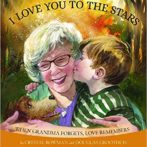Snapshots of Dementia: ‘I Love You to the Stars’
Guest post by Crystal Bowman A note from Marti: Tom finally received a diagnosis of dementia not long before my friend Crystal Bowman wrote a children’s picture book dealing this challenging topic. But even at this stage in our journey, I recognized When Grandma Forgets, Love Remembers as an important work. I’m so thankful for this book, which captures the beauty of the grandparent-grandchild relationship all the way through the dementia journey. I also know a precocious 4-year-old for whom it will have special meaning. I encourage you to check it out for yourself or someone else who may need this vital resource. Senior Moments As we age, we joke about being forgetful or having a senior moment. But when memory loss is the result of dementia or Alzheimer’s, it isn’t funny anymore. With the Baby Boomer population aging, dementia is on the rise. It is estimated that 1 in 10 adults over the age of 65 have some form of dementia. This debilitating disease affects not only the person, but the extended family as well. How do parents explain to their children that Grandma or Grandpa no longer knows their name? Children are sad and confused when the relationship they enjoyed is no longer there. Parents need resources to help children understand why things are different. I Love You to the Stars, When Grandma Forgets, Love Remembers (Kregel Publishing, 2020), is a picture book that enables parents to explain memory loss to a child. The Sweet Story The story begins when Grandma and her dog, Sunny, move in with a young boy and his mother. The boy and his grandma spend hours doing puzzles, reading books, and going to the park. One day, when the boy returns home from school, Grandma is in the driveway with a police officer. She and Sunny went for a walk and got lost. Things continue to worsen when she misplaces items in the house and when she no longer engages in activities. The mother explains that Grandma’s mind is sick and now it is their turn to help her. When they can no longer care for her, she moves to a home where caregivers help with her daily needs. The boy, his mom and Sunny visit her often and enjoy spending time with her again. The message in the story is that even though memories may fade, love will always last. The Story Behind the Story A professor from Denver Seminary lost his brilliant wife to dementia in her early 60s. He wrote about his painful journey in a memoir but wanted to reach children as well. The story of his wife was the inspiration for this book. It is considered...
Read More








